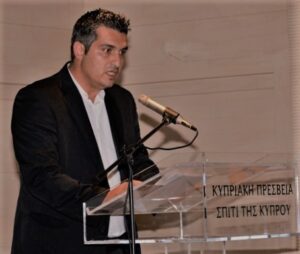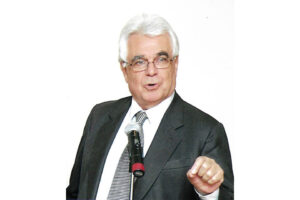Larkos Larkou "The first kingdom here was built by gods"
POETRY OF VASILIS MICHAILIDIS SET TO MUSIC
A resurrection digital disc

Larkos Larkou "talks" with Vassilis Michaelides
When one systematically deals with the life and work of Vassilis Michaelides, it is logical to seek new data, which will contribute to the promotion of research on the great Cypriot poet. Of course, it is good to emphasize that such methodological directions usually add new tiles to an incomplete mosaic, which, if ever completed, will depict, with great clarity, the bio-ergographical portrait of V. Michaelides.
However, more often than not, these efforts do not produce the expected result, either because they are incomplete or because they monotonously and tediously repeat information that has already been pointed out. However, whenever something really new is published (an unknown poem, a date, a correction, etc.), then the bibliography on V. Michaelides is enriched and his scholars collectively express their gratitude. More rarely, something else happens, which, precisely because it is so elusive or, to stick to the mosaic image, so difficult, does not cross the minds of even the most important scholars. I refer, of course, not to the completion of the existing mosaic but to the creation of another, a "parallel" mosaic, which, while not adding new information about the poet, promotes his acquaintance with the wider public, thus aiming to counter the prevailing view that poetry is for the few. And this new mosaic is now the Ariadne's milestone leading to the forgotten, the "obsolete", the "hard-to-find" poet. L. Larkos' digital disc is a rare example of such a "parallel" mosaic.
The composer from Kontea viallge, Cyprus, through the setting of the seventeen poems of V. Michaelides, has laid the foundations for a wider transference of the poetry of the forgotten poet to the entire Greek-speaking (music-loving) public. He has attempted and succeeded to "converse" with a literary artist who died 94 years ago, to listen to his heartbeats and to capture musically the nails of his poetic inspiration. The current (and tomorrow's) listener of these songs will meet a renewed B. Michaelides and, left in an unforgettable musical feast, will be refreshed in the furnace of our contemporary, spiritually weakened era, enjoying lyrics that are pure, clean, transparent, lyrics carved in the workshop of a genuine literary artist, V. Michaelides.
I am not sure if L. Larkou has offered anything new to the literary research on V. Michaelides. After all, that was not his purpose, nor his specialty. Larkou simply managed to give V. Michaelides free access: to every home, to every office, to every leisure centre, to every computer, to every car. He has simply managed to shake off the dust that has accumulated over the years and to pull out of the trunk of history our own literary history. Finally, he simply managed to document in the most eloquent (and musical) way that we have before us the leading poet of Cypriot literature and one of the best of the wider modern Greek literature.
If, in our case, "light" and "sun" refer to "poetry", "blood" to "verses of a poet" and "kingdom" to "the establishment of this poet in the literary firmament of a place", then yes, we could say that L. Larkou has every right to look into the eyes of his Basil, to give him their digital disc and, in return, to whisper to him:
You who killed for the light,
rise and see the sun,
Wake up, see your blood
that it is a kingdom.
Larco, we thank thee!
K.I. Ioannou
Published. "Anev" Magazine, Vol. 43 (Winter 2012) 63-64
___________________________________________

That's what I'm doing now. With the little but effective knowledge I have of the internet, I found your email address and am writing to you about how important your particular work in poetry by Vassilis Michaelides is, which, perhaps coincidentally, comes to be tied to the poet on his anniversary. From your prologue, lyrical and confessional text that begins with the invocation "My Basil" it is clear that the occasion was not the cycle of time that brings an anniversary but an essential experience and this testifies to its genuineness.
It is first of all the scope of this project. And of course the quality that it brings out in the field of music, a difficult, especially for the Greeks, poetry in the Cypriot idiom, but difficult in general and the poetry written in the Katharevousa. You have brought it to life in a direct, functional way, with a skill that brings out your talent and inspiration, both of which you have brought to the roots of the land. H merged together �the Byzantine sounds with the musical motifs of the Cypriot tradition, in an ensemble that stands harmoniously in modern times, presenting the longings and sorrows of the land in general and of man in particular, which delight and move. George Seferis wrote in his "Tests" that tradition does not mean listing and reciting old titles, but works that live and fertilize the creative imagination of today's living people. You have done this in a generous and ideal way and this is what I particularly wanted to emphasise.
The publication that accompanies your disc is exemplary in terms of information and aesthetics. A work that I believe will remain and survive as a whole in time. It will be a point of reference.
I greet and congratulate you
Kostas Serezis
26/12/2017
___________________________________________

Λοιπόν να πεις στον κ. Λάρκου ότι η δουλειά του μού άρεσε πολύ, μα πολύ. Χάρηκα τη μουσική, τη σωστή άρθρωση των τραγουδιστών, αυτόν τον καθαρό κρυστάλλινο ήχο της εγγραφής (παρ´ότι στο δικό μου αντίτυπο του C-D υπήρχαν μερικά μικρά κενά στο τραγούδι «Η Χιώτισσα» μάλλον πρόβλημα στο τύπωμα. Γάιδαρο μου χαρίσανε και τον έβλεπα στα δόντια). Μου άρεσε η ποίηση του Μιχαηλίδη, μα γιατί τον λέτε «αγράμματο», «αμόρφωτο». Αν ο Καρυωτάκης γνώριζε την ποίησή του θα τον θεωρούσαμε δάσκαλό του. Εγώ κάπως έτσι ακούω τα ερωτικά του, σαρκαστικά του καρυωτακικά. Μού άρεσαν τα ταγκουδάκια και τα βαλσάκια των σατυρικών τραγουδιών αλλά εκεί που έδωσα τα ρέστα μου ήταν στα κυπριώτικα. Μορφή και περιεχόμενο το ίδιο. Πώς να το κάνουμε «η 9η Ιουλίου του 1821» βγάζει μια άλλη συγκίνηση όταν ακούγεται στα κυπριακά και όχι στη πανελλήνια ελληνική (τι σωστή και ωραία έκφραση, μπράβο σε όποιον την κατασκεύασε) κι έστω κι αν δεν καταλαβαίνω όλο το λεξιλόγιο. Μου προκαλέσατε μεγάλη συγκίνηση. Πιάνω μια κάποια επίδραση από τα κρητικά ριζίτικα ή έστω την ερμηνεία τους από τον Μαρκόπουλο; Φαντάζεσαι την αρχαγγελική φωνή του Ξυλούρη να τραγουδούσε ένα κυπριακό τραγούδι… Σας ευχαριστώ για το ωραίο δώρο. Σκέφτομαι ότι αυτές οι προσωπικές μαρτυρίες που καταγράφεις είναι μια συνέχεια των γραφτών του Βασίλη Μιχαηλίδη.
Michaila Karambini-Iatrou
___________________________________________

Criticism (retrospective but also related to Easter) for the musical "Chiotissa"
It's not long into the New Year, and I have already unexpectedly received a precious Christmas present from Cyprus. It is the musical text of Larkos Larkos' (b. 1973) work "The Chiotissa", which was published about two years ago in a book-disc, together with other poems set to music by Vassilis Michaelides (1849-1917). What struck me particularly is that the text I received is written in the notation of Byzantine music, in diatonic scale (sound first). In tracing the text, I realized that the participation of the Byzantine choir "Romanos the Melodist" in the orchestration of the work, and its interpretation by the monastic voice of the Protopresbyter Nikolaos Lympouridis were not accidental choices. As Kyriakos I. Ioannou notes: "Through the extraordinary setting of his seventeen poems, the lyre of Vassilis Michaelides will once again begin to 'sing'. Larkos Larkou has achieved something very difficult: he put his hand on the chest of V. He tried to search his heart and managed to touch it. And to sing it." Michaelides had the heart of a neo-Byzantineand modern Greek ethoplasm, who was not just a folk poet, but a Cypriot Regas Feraeus (1757-1798). The aim of the "Chiotissa" (like the "9th of July") was to compile a paean of faith in the rebirth of the nation. Byzantine characteristics of his poems are patience in suffering, resistance and sacrifice, universal human values, faith in the providence of the God-Emperor, the cycle of the Cross-Resurrection. Larkos' composition is a little reminiscent of the melody of the "sperinu" that the rka "loses" in order to stand by the "Turkun", with whom it is connected only by the common human "fate" of suffering and death. The rka, the personification of Romaness, does not oppose the "pleximian" young woman, even if she still considers her alien, but like another good Samaritan, she "parries" her and soothes her pain, and promises her that "in the He always stands, always endures, and shows sympathy for every good citizen, Greek or Turkish. I am glad that among Larkos' colleagues is Ilker Kaptanoglou, on the clarinet. The condemnation of unjust power is not linked to any political ambitions, and the pain described in the song is pain for the land of Cyprus, Chios, and any other "majzeled" homeland. The centre of existence for Michaelides is not logic, but "the soul of the bastard", which is why orthopraxy is the highest of values for the orc. Being poor, she offers Helen a priceless treasure, and from being a "dikakokonitina" she becomes a deaconess of grace. The wisdom that animates her is not academic.reappearance" she will complete her salvation. In fact, in the second part of the story, the salvation of both passes through "one church". For Michaelides, Romanism is transnational, and salvation implies neither revolution nor the use of violence. but empirical, drawn from the toil of the people in which he was educated. Her words, compassionate and comforting, are at the same time a resounding "wow" to the powerful and the unjust who "did him harm". Larkos' work brought me again before a Byzantine "enlightenment" that brightens the heart more than the mind, and offered me a rebaptism in the ecclesiastical tradition of the one (common to all) God the Father. Here in foreign lands especially, such anathemas remind us that religion and homeland are universal experiences, interconnected and dynamic. As descendants of the Byzantines, we know firsthand that human suffering becomes more bearable when viewed through the prism of divine passion. Death does indeed lose its sting when faith in the resurrection, both personal and universal, remains unshaken. Adherence to their roots and origins give wings to both Rkan and Elenin, both Michaelides and Larkou. I feel that even before the Winter Passover season begins, my dear reader, hope has been reborn in me, and the resurrection will not be long in coming. See you!
Anastasios M. Ioannidis, Professor, University of Cincinnati, Ohio, USA ("Politis", 9 Nov. 2014)
___________________________________________
Although I'm very sparing with good words I have to tell you that your album is an excellent creation and I enjoy it every time I listen to it for days now. When you have a date for its presentation in Thessaloniki please let me know for a radio presentation. Sincere Congratulations.
Theodoros Exintaris, 5/10/2012
___________________________________________
Β. MICHAILIDIS - L. LARKOU: A GREAT CREATION
What is a great project? When is a work chosen? In my thinking it is when a creator takes material and gives it poetic or musical wings, if that work becomes a milestone for those who follow, if it paves a way for the future, if it transcends its time, if it leaves behind memories and references. I cite as examples of this category of works of great momentum M. Theodorakis's Axion Estin, G. Theodorakis's Chronicle. Markopoulos, or M. Hadjidakis' Smile of Giokonda. In poetry I mention as examples Dionysios Solomos, Odysseus Elytis or George Seferis. Cyprus has works that are included in this large category, either in the vernacular or in the Cypriot dialect - mainly the poetic work of V. Michaelides, K. Montis and K. Charalambides. In the musical path of works of great impact, M. Christodoulides with his "Akres to Akron", G. Kotsonis with "Lady of the Vineyards", Marios Tokas with "Famagusta Regina" or K. Kostas with the entire work of SYKALY.
Larkos Larkou enters the new page of the great creation in a demanding way with his work "The first kingdom I built was built by gods". The composer took the poetry of Vassilis Michaelides and dressed it with exquisite musical creations, with a unique inspiration on a difficult verse, drawn from the most charismatic poetic vein of the island. Larkos Larkou drew material from the long musical tradition of Cyprus and created a landmark work in its musical events. The composer has shown that he has the strengths to chart a great creative cycle, with sounds or sounds from the Cypriot tradition but with an audience in the West and in the East. In "The first kingdom, the gods had built it here", the composer revives tradition with amazing compositions such as "The chios woman in Limassol in 1821", as well as with sounds based on the musical dimension of the centuries ("The divisions and the sociaties"), like sarcasm as a reaction to tyranny of any kind ("To Cyprus"), like history as a case of subversion (The 9th of July 1821, in Nicosia, Cyprus), or writing that amounts to a hymn to "euphoria" ("One night").
This work signed by Larkos Larkou as well as that of M. Christodoulides ("On the Edge of the Coast") raise the musical creation of the Eastern Mediterranean higher and meet works of the "classical" musical tradition such as "Erotokritos" by V. Kornaros and the unsurpassed Cypriot Akritic Poetry. P. Liasidis defines the classical with the verse that "music and poetry are virtues that do not age". Thus he meets the thought of T. Anthias, as "thought shaped life so much, so much, that man made the earth and the whole universe home". Larkos Larkou responds in a strikingly positive way to the judgments of P. Liasidis and T. Anthias. With his work "My first kingdom was built by gods" he expands our cultural identity because he connects it with contemporary musical trends, proposing a pioneering creation "that widens the mind" in a hard period.
Larkos Larkou (director of CΝΑ- simple synonym with composer)
___________________________________________
AT THE THEATRE OF CHLORAKA On Tuesday, October 2, at the Theatre of Chloraka, the audience had the opportunity to attend a literary event and watch the play "THE FIRST KINGDOM THE GODS HAD BUILT IT HERE" by Larkos Larkos. These are the poems of Vassilis Michaelides, our national poet, a man who, although he died on the mat, nevertheless left behind a magnificent work in the language of the Cypriot dialect and katharevousa, a beautiful language that has its roots in antiquity and which in itself is a well-written poem. Through the extraordinary setting of seventeen poems by Vassilis Michaelides, o Larkos Larkou managed something very difficult, he expressed with precision the meanings that the poet wanted to convey to the people in a singing way, unrepeatable and timeless. Larkos Larkou, is a great musician who set to music a great national poet. He has written a musical work that took a long time to prepare and consists of a digital disc that includes 17 poems set to music and is accompanied by a well-written book with an elegant appearance in which the reader can treat the work of our National Poet with empiricism. With the simple gentleness of his music and his melodious compositions that both entice and intervene in the minds of the listeners and guide them accurately in reading and listening to the whole work, the same helps them in choral accompaniment of the songs with precision, The compositions of Larkos Larkos are a reflection of Cypriot musical origins with the same final result as the music of the great composers of Hellenism Theodorakis and Hadjidakis, whose simplicity of their music was the most important thing that characterized them as creators [... ]KYRIAKOS TAPAKOUDIS
___________________________________________
POETRY OF VASILIS MICHAILIDIS SET TO MUSIC
Larkos Larkou "The first kingdom here was built by gods"
Vassilis Michaelides... A name familiar to most of us, but forgotten by many others. A major poet who offered so much with his unique work, which, for almost a century, continues to touch and move. The well-known composer Larkos Larkou, who, with the help of great artists and literary figures, has managed to bring this man to life again with a digital disc (CD) which includes seventeen poems set to music by Vassilis Michaelides, but also an accompanying booklet in which the lyrics of the poems that have been set to music are listed as well as various other interesting information about the life and work of the great Cypriot bard.
Reading the "prolegomena" of the book that accompany the digital disc, we notice that Vassilis Michaelides did not only write in the Cypriot dialect, but also used the Panhellenic language (demotic and katharevousa). In fact, most of his poems set to music are written in this language instead of, as one would expect, in the vernacular; however, all together they sum up in a harmonious way the poetic portrait of perhaps the greatest poet of Cypriot literature. Thus, it would not be an exaggeration to claim that, by listening to these poems set to music, one has a first-class opportunity to enjoy musically the erotic, lyrical and national yearnings that gush from the pen of this great poet. Lyrics such as
In the voice of the nightingale I found thy voice
and in the snow-white of thy soul.
in the golden sunrise the colour of your hair
and in the blue sky the color of your eyes.
("Far from you")
and, most importantly,
Romulanness is a race of a world in the midst of time,
no one has been found to eliminate it,
none, for my God protects her from the heights.
Let the Romulanness be lost, when the world is gone!
("The 9th of July...")
condense meanings of infinite poetic inspiration, which, in my opinion, add timelessness, depth and intensity, while, at the same time, they highlight the source talent of our poet (afflicted by the hardships of life).
In attempting a more penetrating look at the book-cd, we must observe that such a careful edition could not be based on chance or sloppy work. Apart from Larkos Larkos, who was responsible for the orchestration, important Greek and Cypriot artists, such as Alkinoos Ioannidis, Christos Thivaios, Giannis Kotsiras, Kostas Hatzis, Vassilis Papakonstantinou, Kyriakou Pelagia, took part, who performed with great success the poems by Vassilis Michaelides set to music, while the philologist Kyriakos Ioannou was the literary editor of the book, as well as the editor of the poems together with the university professor Lefteris Papaleontiou.
Personally, I have read this book and listened to the interpretation of the poems included on the digital disc. The amazing thing in such a case is that this double sensation (reading-music listening of the poems) creates unprecedented aesthetic pleasures, through which even the most difficult meanings of the verses are captured more deeply. The words (now set to music) come alive, are impressed more brightly in our minds and, ultimately, are more easily channeled into our subconscious. Vassilis Michaelides (re)comes alive, returns from the past and triumphantly enters the present: to encourage us to get to know him better, to enjoy him and to applaud him. His voice merges with the voice of Alkinoos Ioannidis, Yannis Kotsiras, Vassilis Papakonstantinou and all the other fine performers - and the result is, indeed, astonishing! In short, this work teaches by enthralling, captivating even the most indifferent reader-listener
I must confess that I am particularly impressed by "The 9th of July...", because of the vividness and immediacy that both its reading and the listening of its "version" set to music creates. This particular poem, which we had the opportunity to learn (albeit in fragments) in the first grade of high school, refers to the period of the Greek Revolution of 1821 and, specifically, to the martyrdom of Archbishop Kyprianos and the three bishops by the Turks. Kostas Charalambidis, Ilker Kaptanoglou, Michalis Terlikkas, Michalis Hadjimichael, as well as the Byzantine Choir "Romanos the Melodist", under the direction, of course, of the music composer Larkos Larkos, have managed to lift up this magnificent epic poem, spreading shivers of emotion and pride for our origin.
In short, each of the seventeen poems in the book-cd is unique and highlights the contribution of Vassilis Michaelides to the literary firmament of our Cyprus. Finally, it is worth mentioning that the title of the work itself ("The first kingdom here was built by gods") is taken from the poet's poem "Troodos".
Thea Sofokleous
___________________________________________
Larkos Larkou, with the poetry set to music by Vassilis Michaelides, delivered, with his signature and his excellent musical training, to future generations an essential, remarkable and monumental work that honours and upgrades and promotes our culture. GEORGE PETOUSIS 27/9/2017
___________________________________________
I enjoyed "Anerada" and I thought the setting in "Chiotissa" was excellent. I make no secret that I was moved to tears especially in this case. But in all the poems, Larkos Larkou gives soul with his music". Dr. Lefteris Papaleontiou
___________________________________________
Larko, congratulations on catching these species,
bits and pieces of tradition, coming from Michaelides
Whatsoever good thing thou desirest in thine own house.
Larko, you honor your roots, you honor yourself. Kyriakou Pelagia
___________________________________________
The song you gave me is not nice, but amazing! Kostas Hatzis
___________________________________________
It's a great thing to be able to translate love with reality, with the land, with the earth, with the blood, into such a beautiful song. Giannis Kotsiras
___________________________________________
Just as we are accompanied by Eros, we are also accompanied by the word that Vassilis Michaelides used more than a hundred years ago. Christos Thivaios
___________________________________________
A man, who died "on the mat", left such a great work behind him, in this language, katharevousa, which we are sadly lacking in Greece today. Manoslis Mitsias
___________________________________________
Our birth must not be lost and this language [cleansing and vernacular] gave birth to Greeks everywhere in the world. Vasilis Papakonstantinou
___________________________________________
It is a very difficult task to set poems by Vassilis Michaelidis to music and I wish good success in this work of his friend Larkos Larkou. Michalis Terlikkas
___________________________________________
I like the whole thing when I see Larko making it stitch by stitch. The way he works I have the feeling that it also gives it the character of timelessness. Petros Gaitanos
___________________________________________
Michaelidis has a different authenticity – he is popular in the sense of depth, of root. And it is very interesting for me to sing in my language, in my dialect. Alkinoos Ioannidis
___________________________________________
It is a phenomenon of our country that many great Greek musicians have set great poets to music. This is a blessing from God. This place has sung the songs of most poets. Vasilis Lekkas
